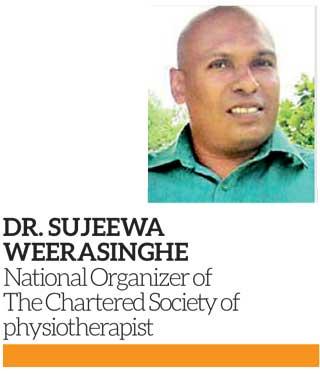Reply To:
Name - Reply Comment
 COVID-19 is seen as a disease that primarily affects the lungs; it can damage many other organs as well. This organ damage may increase the risk of long-term health problems. Older people and people with many serious medical conditions are the most likely to experience lingering COVID-19 symptoms, but even young, otherwise healthy people can feel unwell for weeks to months after infection. There are common signs and symptoms that linger over time.
COVID-19 is seen as a disease that primarily affects the lungs; it can damage many other organs as well. This organ damage may increase the risk of long-term health problems. Older people and people with many serious medical conditions are the most likely to experience lingering COVID-19 symptoms, but even young, otherwise healthy people can feel unwell for weeks to months after infection. There are common signs and symptoms that linger over time.
Some adults and children experience multisystem inflammatory syndrome after they have had COVID-19. In this condition, some organs and tissues become severely inflamed. To enlighten you on this condition we spoke to Dr. Sujeewa Weerasinghe, National Organizer of the Chartered Society of Physiotherapist, The Vice President
World Disability and Rehabilitation Professionals Association and a medical practitioner who possesses an International Certificate in Coronavirus.
Heart damage during COVID-19 
A growing number of studies suggest many COVID-19 survivors experience some type of heart damage, even if they didn’t have underlying heart disease and weren’t sick enough to be hospitalised. This latest twist has worried health care experts about a potential increase in heart failure. More recently, there is recognition that even some of those COVID-19 patients not hospitalized are experiencing cardiac injury.This raises concerns that there may be individuals who get through the initial infection, but are left with cardiovascular damage, and complications such as myocarditis, an inflammation of the heart muscle, could lead to an increase in heart failure down the road. People with pre-existing heart disease who don’t have COVID-19, but who avoid coming into the hospital with heart problems out of fear of being exposed to the virus.Nearly one-fourth of those hospitalised with COVID-19 have been diagnosed with cardiovascular complications, which have been shown to contribute to roughly 40% of all COVID-19-related deaths. It can be difficult to identify who is at risk, or for those recovering from the virus to know if they’re having heart problems.
Those recovering from COVID-19 must watch for the following symptoms – and consult their physician or a cardiologist if they experience the following: increasing or extreme shortness of breath with exertion, chest pain, swelling of the ankles, heart palpitations or an irregular heartbeat, not being able to lie flat without shortness of breath, waking up at night short of breath, lightheadedness or dizzy spells.
Brain fog in COVID-19
COVID-19 may also cause brain fog in some cases, especially in those with more severe cases of the disease that can persist well after recovery of other symptoms.many discharged COVID-19 patients had lingering issues with concentration issues and memory loss respectively. Some people who’ve had COVID-19 report brain fog that lasts for weeks or even months after their other symptoms — like cough, fatigue, or fever —have gone away but in some cases, brain fog, or cognitive impairment, can last for many months after the disease concludes.
COVID-19 can also have significant neurological effects such as the loss of the sense of taste/smell and headaches, for example. In the most severe cases, the lack of oxygen in the blood can have long-lasting negative consequences on the brain and other organs. Some people who’ve had COVID-19 develop complications such as altered consciousness or encephalopathy. Due to increased levels of inflammatory cytokines in the fluid surrounding the brains of people weeks after their COVID-19 infection. Cytokines are molecules produced by your immune system that encourage inflammation. Inflammation in the brain hinders the ability of neurons to communicate with each other. This may be one of the factors that contributes to brain fog. Researchers have also identified Trusted Source microstructural changes in the hippocampus and other areas of the brain after COVID-19. They believe that these changes may also contribute to cognitive impairments. Some people with COVID-19 report of having brain fog for weeks or months after their respiratory symptoms subside. It’s thought that a combination of physiological changes in the brain and psychological factors may contribute to this condition.
Symptoms of brain fog can include: memory problems, lack of mental clarity,poor concentration, feeling “out of it”, headaches, confusion, Fatigue, Shortness of breath or difficulty breathing, Cough, Joint pain, Chest pain, Memory, concentration, or sleep problems, Muscle pain or headache, Fast or pounding heartbeat, Loss of smell or taste, Depression or anxiety, Fever, Dizziness when you stand, Worsened symptoms after physical or mental activities.
At this time, it’s not clear why some people develop some type of heart damage or brain fog and others don’t. People with severe cases of COVID-19 seem to be at a higher risk of Trusted Source for developing neurological symptoms than people with mild disease. But some people seem to have this brain fog out of proportion to their illness and there is recognition that even some of those COVID-19 patients not hospitalised are experiencing a cardiac injury They had a mild illness and they recovered except that they continue to have long-lasting cognitive problems.
The good news is there’s no evidence that this mental fog is permanent, so we can be cautiously optimistic in the hopes that it will resolve and you return to normalcy. People do recover, so it is important to be hopeful and positive. To give you the best chance of recovery, people should slowly try to get back to their normal routine. Leading a healthy lifestyle, doing physical exercise, and keeping your mind busy, whether through work or puzzles, are all recommended.
Much is still unknown about how COVID-19 will affect people over time, but research is ongoing. Researchers recommend that doctors closely monitor people who have had COVID-19 to see how their organs are functioning after recovery.
Who’s at risk?
At this point, health experts aren’t sure who’s going to have long-haul symptoms and who will not.Some people who only had mild disease will still have a risk of developing long-term side effects.
At this point, the best bet to protect yourself is to get vaccinated — even if you’ve already had COVID-19.
A vaccine will likely protect you from reinfection with a potentially more dangerous strain or variant of the virus.
The best practice for the prevention of having COVID complications remains vaccination. Vaccines have been shown to prevent severe COVID illness and protect people that may have had the infection previously from getting sick from a newer variant of the virus
It’s important to remember that most people who have COVID-19 recover quickly. But the potentially long-lasting problems from COVID-19 make it even more important to reduce the spread of COVID-19 by following precautions. Precautions include wearing masks, social distancing, avoiding crowds, getting a vaccine when available, and keeping hands clean.